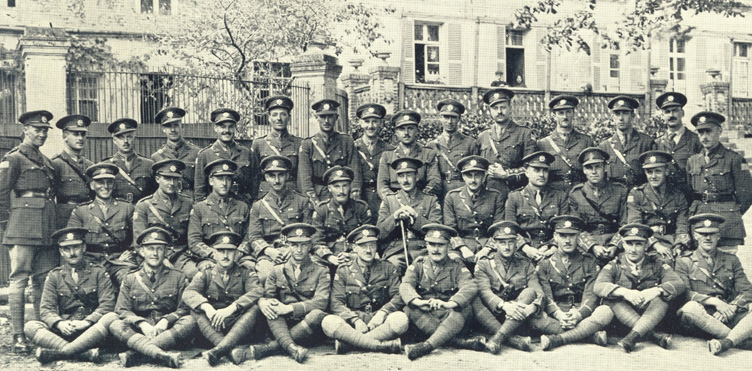A soldier's story: Lt. Roy Duplissie
Written by Brad Ackerson, (BA (Honours) history student)

Officers of the C.E.F. Battalion, The Royal Canadian Regiment, in Berneville, France, 1918.
Late in the morning of Sept. 28, 1918, having just commandeered a German machine gun, two accomplished Canadian soldiers kneeled side by side bravely fending off an assault by German forces.
Prior to this pivotal moment, these two young men had travelled comparable roads in life. Lieutenant Roy Duplissie, who grew up in Saint John, and Lieutenant Milton Gregg, who hailed from nearby Snider Mountain, both enlisted in the army as teenagers and were quickly recognized by their peers as natural leaders.
The events following their enlisting would take both men’s lives in entirely different directions.
Worn down by hours of intense combat, Gregg and Duplissie were separated from the rest of their men. Together, they navigated thick lines of barbed wire while dodging a relentless barrage of machine gun fire. Gregg and Duplissie fought their way into the German territory and prepared to fend off an approaching German counterattack.
The pair waited for the German soldiers to come within 20 yards before launching a volley of grenades that stopped the enemy in their tracks, forcing the surviving German soldiers to retreat.
Undeterred, Duplissie used a nearby German MG-08 machine gun to continue the assault. Gregg fed rounds into the German gun while Duplissie fired it to break up a second German counterattack. Moments later, Duplissie was shot and killed while Gregg valiantly attempted to fight back only to be knocked unconscious.
Against all odds, Gregg was able to regain consciousness, locate fellow surviving Canadian soldiers, and launch another attack at the enemy. His heroics on this day earned him the Victoria Cross, the most prestigious award in the British honours system.
Duplissie would not receive recognition for his contributions to the battle. Instead, the 22-year-old lay dead some 5,000 kilometres away from home, his story largely going untold.
With the First World War ending just six weeks after the battle that killed Duplissie, Milton Gregg returned home a hero. Despite spending a number of years post-war drifting from job to job, his track record of leadership and military accomplishment earned him the role of Sergeant at Arms in the Canadian House of Commons, a job he was in for six years until the outbreak of World War Two.
Gregg was appointed president of the University of New Brunswick in 1944 before transitioning to politics a few years later having been elected as a Member of Parliament in the York-Sunbury riding and serving in the cabinets of two different Liberal Prime Ministers as Minister of Fisheries, Minister of Veterans Affairs, and Minister of Labour. The final decade of his illustrious career was spent as a United Nations diplomat.
The success Gregg enjoyed as a public servant and leader during his post-military career raises the question, “What if Roy Duplissie also survived the war?”
“We know from Gregg’s diary how highly he spoke of young Roy Duplissie, and that his death left a lasting impression on him,” said Dr. Lee Windsor, whose chapter in Portraits of Battle Courage, Grief, and Strength in Canada's Great War profiles Duplessie.
Duplissie’s ascent through the military ranks mirrored that of Gregg’s. Both men had a way of earning the respect of their peers and superiors in short order. Their strength under pressure, determination, and their innate ability to galvanize those around them was evident both on and off the battlefield. These traits made them great soldiers, but only Gregg was able to live out his potential.
It is a cruel reality of warfare that merit has no bearing on who loses their life in battle and who returns home as a hero. If war was fair, both men would have returned from the harrowing battle side-by-side, just as they were for those brief moments behind the commandeered MG-08.
Perhaps Duplissie would have been awarded a Victoria Cross of his own.
Perhaps he would have joined Gregg at UNB to help mold future generations of leaders or forged a new path into politics and continued serving his country in a new capacity.
Perhaps Gregg and Duplissie would have spent their golden years together at their local Legion branch recalling the day they barely made it out alive and remembering the countless other great young leaders they encountered along the way.
Gregg’s rich post-war legacy offers just a hint at what could have been if Duplissie survived. Now, we are left wondering what was lost when that bullet struck Duplissie on that fateful morning of Sept. 28, 1918.
